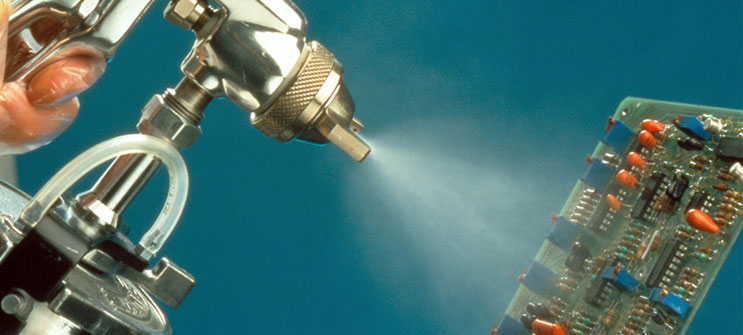
Easily Processed Coatings for Higher Reliability
Printed circuit boards (PCBs) form the foundation for many applications in automotive, consumer devices, communications and industrial and energy. Yet these PCBs are often exposed to damaging environmental factors, ranging from moisture, dust and harsh chemicals to extreme thermal cycling and vibration.
PCB conformal coating is the process of applying a polymer film of 25-75µm thick (50µm typical) to safeguard the components in the printed circuit boards. The coating helps protect the electronic components against various types of environmental hazards, debris, and aggressive chemicals. Fineline Circuits & Technology offers a variety of conformal coatings for Printed Circuit Boards (PCBs). Our services strive to meet medium, low, or high volume conformal coating requirements for various circuit boards.
Types of PCB Conformal Coating
At Fineline Circuits & Technology, a full range of pcb conformal coating services using various types of coatings. The coatings are applied with the help of a brush, spray, and by dip coating.
- Acrylic Resin: Acrylic resins are usually one type of solvent dissolvable preformed acrylic polymers Acrylic coating facilitates easy repair work, as it gets easily dissolved in many organic solvents. Our acrylic coating provides good fungus and humidity resistance, dries easily, and has a longer pot life.
- The coating offers superior, smooth and crystal clear finish
- Acrylic coating conforms to Mil-I-46058C and IPC-CC-830 standard specifications.
- Parylene: Parylene is a polymer based compound, which consists of linear and crystalline shaped polymers. The coating is applied in a vacuum environment, which spreads on the material as a gas to form a clear polymer film.
- The coating can penetrate through the spaces as narrow as 0.01mm.
- Owing to good thermal endurance properties, the coating has an operating temperature range of -200ºC and 150ºC.
- Parylene coating adheres to USP Class VI Plastics requirements and is FDA approved. The coating are MIL-I-46058C / IPC-cc-830B listed (as class XY). Parylene coating is able to meet NBC requirements in AR70 / AFR80-38 / Navinst 3400.2.
- Polyurethane: Polyurethane coating provides enhanced chemical resistance, and has excellent dielectric properties. We provide polyurethane coating in a single component, two component, UV curable, and water borne systems.
- Polyutherane coating is Mil-I-46058C and IPC-CC-830 approved.
- The coating offers excellent adhesion while working in all types of climate and has a high dielectric value.
- These coatings offer a good resistance to humidity.
- Epoxy: Epoxy resin coating is available as two part compound, and has a good abrasive, chemical, and humidity resistance.
- The coatings can work in temperatures up to 150°C.
- Epoxy coating provides a rigid coating on the surface. This offers a superior abrasive and chemical resistance.
- Silicones: Silicone resins are a soft, transparent, and flexible coating, which offers excellent corrosion resistance, chemical resistance, etc. The silicone coating has a low dissipation factor, which makes them suitable for high impedance circuitry.
- Silicone coating can work in the temperature range of 55°C to 200°C.
- The coating has good thermal, UV, and humidity resistance, which helps protect fine components.
- The coating has excellent light transmission properties, which makes it ideal for solar applications.
- This coating conforms to MIL-I-46058C and IPC-CC-830 standards.
As discussed, PCB conformal coating services help protect PCB Assemblies and improve their overall quality. Over the years, we provided unprecedented conformal coating services to diverse industries.

